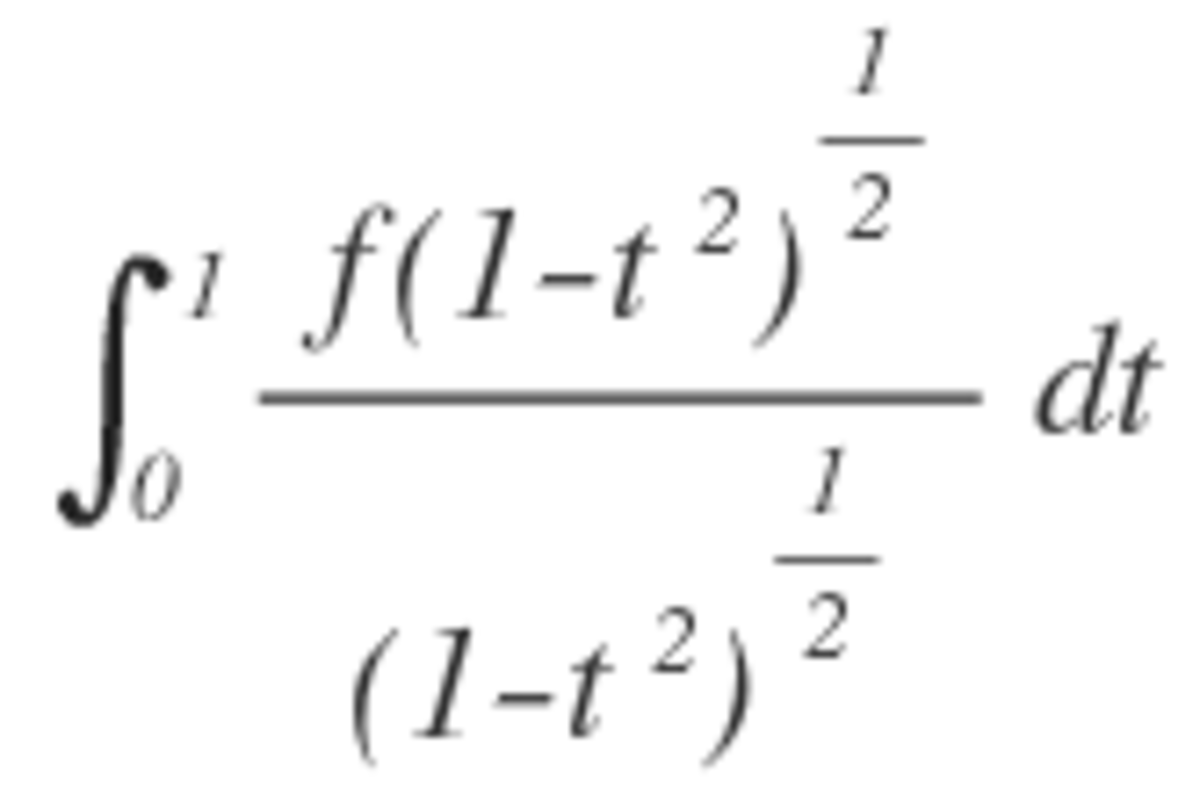Can You Do It?
Given that f ( x ) satisfy the equation f ( x ) + f ( 1 − x 2 ) = 2 , compute ∫ 0 1 1 − x 2 f ( x ) d x .
Give your answer to 3 decimal places.
This problem is not original.
The answer is 1.571.
This section requires Javascript.
You are seeing this because something didn't load right. We suggest you, (a) try
refreshing the page, (b) enabling javascript if it is disabled on your browser and,
finally, (c)
loading the
non-javascript version of this page
. We're sorry about the hassle.
3 solutions
Solution as suggested by @shubham dhull
We note that f ( x ) = 2 x 2 satisfies the condition as:
f ( x ) + f ( 1 − x 2 ) = 2 x 2 + 2 ( 1 − x 2 ) 2 = 2
Therefore,
∫ 0 1 1 − x 2 f ( x ) d x = ∫ 0 1 1 − x 2 2 x 2 d x = ∫ 0 2 π cos θ 2 sin 2 θ cos θ d θ = ∫ 0 2 π 2 sin 2 θ d θ = ∫ 0 2 π ( 1 − cos ( 2 θ ) ) d θ = [ θ − 2 1 sin ( 2 θ ) ] 0 2 π = 2 π Let x = sin θ ⟹ d x = cos θ d θ
Thanks A Lot Sir!
but the condition provided can be satisfied by defining other functions such as f(x) = 2*x^2 , the condition will be satisfied for all x. but after putting that value of f(x) and integrating i get the answer as pi/4. plz tell?
Log in to reply
Thanks for your question. I initially wanted to explain it that way. That was why I mentioned in the solution that f ( x ) = 2 x 2 but I didn't know how. Now I do, and it is as shown above. You probably have done your calculation wrong.
Log in to reply
oh yes i forgot to multiply a 2 after integration as i did in my mind without writing on paper and forgot that i took 2 common outside . thanks for showing me solution by my method.
sorry for bothering you again, i found the best method to do it and possibly the shortest one, you can assume f(x) to be a constant valued function having value one and then integrate it.
In the integral , directly substitute
x
=
(
1
−
t
2
)
2
1
.
You would see that the integral transforms to
 Add them to get I = pi/2
Add them to get I = pi/2
G i v e n f ( x ) + f ( 1 − x 2 ) = 2
P u t x = s i n θ t h e n w e s e e t h a t ,
f ( s i n θ ) + f ( c o s θ ) = 2
N o w u s e t h e s a m e s u b s t i t u t i o n i n t h e I n t e g r a l t o g e t ,
∫ 0 1 1 − x 2 f ( x ) d x
= ∫ 0 π / 2 c o s θ f ( s i n θ ) c o s θ d θ
= ∫ 0 π / 2 f ( s i n θ ) d θ
L e t t h i s b e I
B y p r o p e r t i e s o f d e f i n i t e i n t e g r a l ,
I = ∫ 0 π / 2 f ( s i n ( π / 2 − θ ) d θ
I = ∫ 0 π / 2 f ( c o s ( θ ) d θ
T h u s ,
2 I = ∫ 0 π / 2 f ( s i n θ ) + f ( c o s ( θ ) d θ
2 I = 2 ∫ 0 π / 2 d θ
2 I = π
H e n c e , ∫ 0 1 1 − x 2 f ( x ) = π / 2